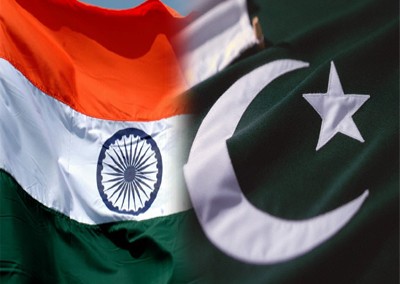Peace talks between India and Pakistan collapsed on Saturday hours before they were scheduled to start, as the nuclear-armed rivals were unable to overcome deep-rooted mutual mistrust.
Indian prime minister Narendra Modi and Pakistan’s Nawaz Sharif agreed to the talks when they met in Russia last month. But the countries failed at the last minute to agree the agenda for the meeting of their national security advisers, due to start on Sunday, with Pakistan accusing India of imposing ‘preconditions’.
Pakistan pulled out after India’s foreign minister, Sushma Swaraj, said the talks would not take place if Pakistan’s NSA Sartaj Aziz did not drop plans to meet separatists from the disputed region of Kashmir.
Swaraj also said India would only discuss terrorism-related issues, whereas Pakistan wanted a wider agenda that would, among other things, discuss the Kashmir question.
Pakistan said ‘talks cannot be held on the basis of the preconditions set by India.’
‘We have come to the conclusion that the proposed NSA level talks between the two countries would not serve any purpose,’ Pakistan’s foreign ministry said in a statement.
‘It is not reasonable for India to now assume the right to decide unilaterally that from now onwards, other issues will be discussed after terrorism has been discussed and eliminated.’
Earlier on Saturday, Aziz said that by setting conditions India had ‘virtually’ cancelled the talks.
India called Pakistan’s decision ‘unfortunate’.
India and Pakistan have fought three wars since becoming separate nations in 1947, two of them over the Himalayan region of Kashmir, which both claim in full but rule in part.
New Delhi has for years accused Pakistan of backing separatist Muslim rebels in India’s part of Kashmir. Pakistan denies the allegations.
In August last year, India called off planned meetings between the countries’ foreign secretaries.
The prospects of the long-awaited talks had been clouded in recent weeks by a series of militant attacks and border skirmishes. Swaraj said there has been 91 ceasefire violations since the meeting between the premiers.
But the divergence of talking points was one of the main stumbling blocks: Indian official sources had said they wanted to provide proof that militants were getting support from over its western border, while Pakistan wanted the talks to be broader and include issues on Kashmir.
Aziz said he was planning to present India’s NSA Ajit Doval three dossiers on what he called the Indian intelligence wing’s involvement in promoting terrorism in Pakistan.
Pakistan earlier said it was never expecting the talks to lead to any breakthrough and the purpose was only to reduce tensions between the neighbours.
Indian prime minister Narendra Modi and Pakistan’s Nawaz Sharif agreed to the talks when they met in Russia last month. But the countries failed at the last minute to agree the agenda for the meeting of their national security advisers, due to start on Sunday, with Pakistan accusing India of imposing ‘preconditions’.
Pakistan pulled out after India’s foreign minister, Sushma Swaraj, said the talks would not take place if Pakistan’s NSA Sartaj Aziz did not drop plans to meet separatists from the disputed region of Kashmir.
Swaraj also said India would only discuss terrorism-related issues, whereas Pakistan wanted a wider agenda that would, among other things, discuss the Kashmir question.
Pakistan said ‘talks cannot be held on the basis of the preconditions set by India.’
‘We have come to the conclusion that the proposed NSA level talks between the two countries would not serve any purpose,’ Pakistan’s foreign ministry said in a statement.
‘It is not reasonable for India to now assume the right to decide unilaterally that from now onwards, other issues will be discussed after terrorism has been discussed and eliminated.’
Earlier on Saturday, Aziz said that by setting conditions India had ‘virtually’ cancelled the talks.
India called Pakistan’s decision ‘unfortunate’.
India and Pakistan have fought three wars since becoming separate nations in 1947, two of them over the Himalayan region of Kashmir, which both claim in full but rule in part.
New Delhi has for years accused Pakistan of backing separatist Muslim rebels in India’s part of Kashmir. Pakistan denies the allegations.
In August last year, India called off planned meetings between the countries’ foreign secretaries.
The prospects of the long-awaited talks had been clouded in recent weeks by a series of militant attacks and border skirmishes. Swaraj said there has been 91 ceasefire violations since the meeting between the premiers.
But the divergence of talking points was one of the main stumbling blocks: Indian official sources had said they wanted to provide proof that militants were getting support from over its western border, while Pakistan wanted the talks to be broader and include issues on Kashmir.
Aziz said he was planning to present India’s NSA Ajit Doval three dossiers on what he called the Indian intelligence wing’s involvement in promoting terrorism in Pakistan.
Pakistan earlier said it was never expecting the talks to lead to any breakthrough and the purpose was only to reduce tensions between the neighbours.
Source: New Age









